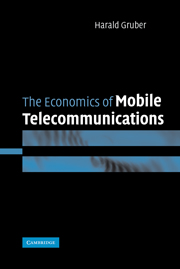Book contents
- Frontmatter
- Contents
- List of figures
- List of tables
- Preface
- List of abbreviations and acronyms
- 1 Introduction
- 2 Stylised features of the mobile telecommunications industry
- 3 The evolution of national markets for cellular mobile telecommunications services
- 4 The determinants of the diffusion of cellular mobile telecommunications services
- 5 Market conduct and pricing issues in mobile markets
- 6 Issues in radio spectrum management
- 7 The evolution of market structure in mobile telecommunications markets
- Appendix
- Bibliography
- Index
5 - Market conduct and pricing issues in mobile markets
Published online by Cambridge University Press: 22 September 2009
- Frontmatter
- Contents
- List of figures
- List of tables
- Preface
- List of abbreviations and acronyms
- 1 Introduction
- 2 Stylised features of the mobile telecommunications industry
- 3 The evolution of national markets for cellular mobile telecommunications services
- 4 The determinants of the diffusion of cellular mobile telecommunications services
- 5 Market conduct and pricing issues in mobile markets
- 6 Issues in radio spectrum management
- 7 The evolution of market structure in mobile telecommunications markets
- Appendix
- Bibliography
- Index
Summary
Introduction
The mobile telecommunications industry is an interesting laboratory in which to study the market behaviour of firms with market power. This is the realm of oligopoly theory, which has made huge progress since the 1980s, in particular thanks to the game theoretic approach. The matching of theory with empirical evidence has brought many new insights for the industrial organisation literature and has been proved very useful in providing normative purposes for regulators, in particular in designing markets. Firms have scope for reducing price competition by means of appropriate choice of product differentiation. Oligopoly theory proved to be a difficult subject because the equilibrium outcomes in oligopoly models are very sensitive to the behavioural assumption of firms. The problem is typically represented as a three-stage game in which firms (1) first decide on entry, (2) then on product characteristics and (3) finally on the nature of price competition. This chapter is not concerned with the entry decision (1), which will be considered in chapters 6 and 7, but it deals with stages (2) and (3), which are concerned with product specification and pricing behaviour, respectively.
The mobile telecommunications industry is a network industry where different networks compete for customers. Pricing decisions thus depend on interaction with other networks and are also constrained by regulatory decisions. The theoretical and practical foundations of pricing in telecommunications have changed significantly along the technological trajectory of the industry and its market structure.
- Type
- Chapter
- Information
- The Economics of Mobile Telecommunications , pp. 171 - 222Publisher: Cambridge University PressPrint publication year: 2005



